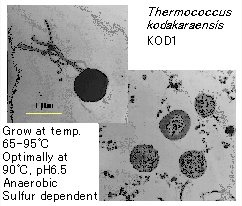Hyperthermophiles
Microorganisms are capable of living almost everywhere on earth from the deep bottom of sea to the top of high mountains. Hyperthermophiles are the group of microorganisms whose maximum growth temperature is over 85-90˚C. Phylogenetic analysis based on the 16/18S rRNA gene sequence suggests that they are located close to the bottom of evolutionary tree of living organisms. We have isolated Theromcoccus kodakaraensis (formerly Pyrococcus sp.) KOD1 from a solfatara from Kodakara island in Kagoshima prefecture, 1994, with the help of Marine Biotechnology Institute, Kamaishi[10], Japan(Fig. 1, 2).
Extremely thermotolerant protease, Tk-subtilisin
Strain KOD1 produced a unique thiol protease whose optimum reaction temperature was 110˚C [10]. Later, a gene encoding subtilisin-like serine protease (37.4% identical), Tk-subtilisin, was cloned and successfully expressed in E. coli. Optimum temperature for Tk-subtilisin was 80-85˚C. Tk-subtilisin has 13 to 20 amino acids insertion at three positions.[39]
Minimum recombination enzyme, Tk-Rec/ RadB
RecA in prokaryotes and Rad51 in eukaryotes are homologous recombination enzymes for DNA damage repair that are essential for all the living organisms. The gene encoding a RecA homologue, Tk–rec, was located in the flanking region of 16S rRNA gene in strain KOD1. It was found that the gene product Tk-REC has only a central catalytic domain of RecA with neither N-terminal nor C-terminal extensions. It was also found that the recombinant E. coli (recA–) cells harboring Tk–rec fully restored UV resistant activity [14, 15]. This fact suggests that Tk-Rec is an ancestral minimum recombination protein.
General transcription factor
Archaea is prokaryote but it is closer to eukaryote because it has general transcription factor, TATA-binding protein (TBP). We found that pI of Tk-TBP is 4.8 (strongly acidic) which may repel negatively charged DNA, suggesting existence of another transcription factor[12]. We successfully purified Tk-TBP interacting 26 kDa protein, namely TIP by affinity column chromatography. Gene encoding TIP was cloned and expressed in E. coli with TBP. It was revealed that Tk-TIP clearly inhibited the binding of TBP to the promoter sequence. Tk-TIP was found to be a negative transcription factor unique to archaea[28]. Archaea seems to adopt more complex transcription regulation system than previously expected.[42]


